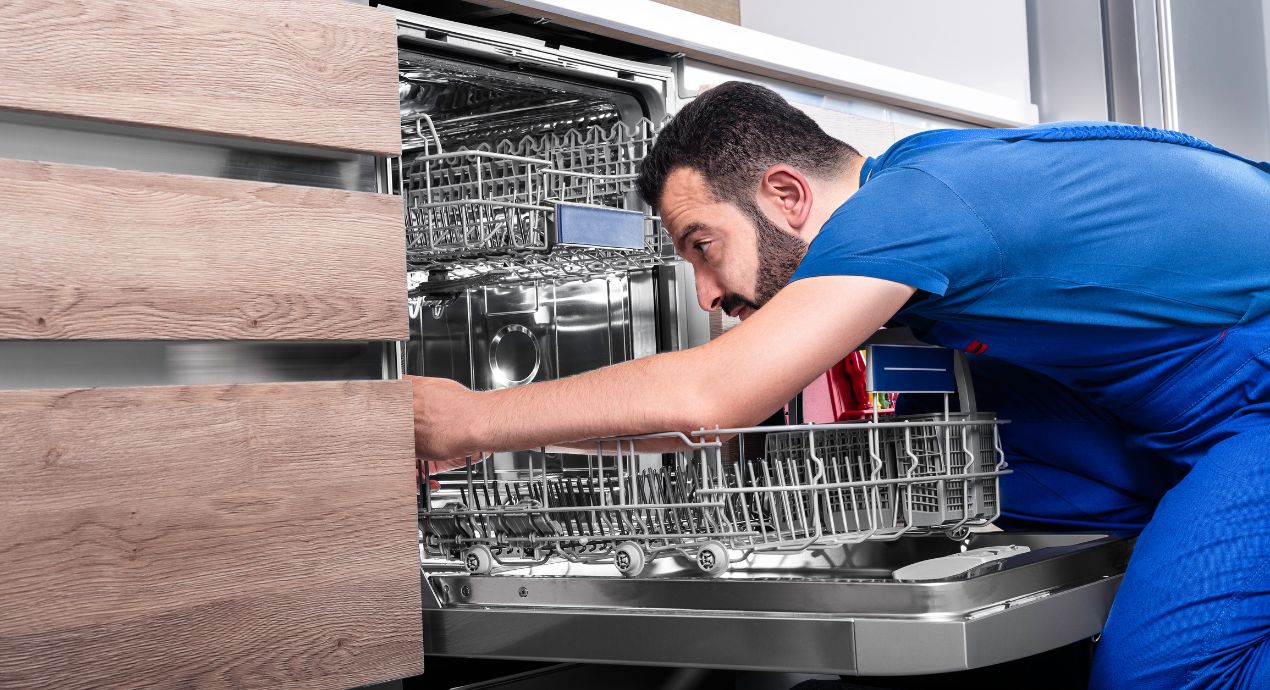
Contemplating coverage?
Subscribe to receive our emails & get
$200 off!
Have questions?
Call us: (833) 544-8273


Written By Ellie Brooks
Our home appliances need more care and maintenance than most people realize. You might think a dishwasher is in effect a self-cleaning machine, but it in fact requires regular upkeep. Neglecting routine cleanings will lead to increased repair costs and a shorter machine lifespan.
This article will review why it’s important to clean your dishwasher and how to best go about it.
Dishwashers undergo a great deal of wear and tear. Internal components are subject to moisture, steam, and high heat with every cycle. Even if you are diligent about rinsing your dishes before loading them into your machine, your dishwasher will gradually accumulate food particles and oils. Hard water will lead to mineral deposits over time.
At best, not cleaning your dishwasher will make for a less efficient machine. You may notice an oily film or residue on your dishes, or a stale odor. At worst, an internal component may fail, rendering the entire machine inoperable. You will have to pay to repair or replace your dishwasher much earlier than you otherwise would have.
The recommended frequency of dishwasher cleaning is dependent on how often you use the appliance. If you do a lot of cooking and run your dishwasher every day, monthly cleanings are appropriate. If instead you go several days without using your dishwasher, cleaning it once every two or three months is reasonable.
Don’t overlook the importance of cleaning under dishwasher units too. Dust and crumbs collect beneath kitchen appliances, inviting pests and exacerbating allergies.
There's a reason Liberty Home Guard was rated the #1 Home Warranty Service by U.S. News and World Report for 2021, 2022, 2023, and 2024. Check out our services.
Learn MoreCleaning a dishwasher is easy to do with a few common household items. Just follow our step-by-step walkthrough.
Vinegar is an effective odor neutralizer, and it can break down grime and mineral buildup. Pour a cup of white vinegar in the bottom of your empty dishwasher, then run a cycle without any dishes.
Most dishwashers have a filter or trap to catch small bits of debris. If it becomes clogged with food, grime, dust, and other material, you will likely encounter drainage problems or inefficient cleaning.
Remove the filter and clear it of any residue with a paper towel or rag. Wash the filter in warm soapy water and set it aside to dry while you clean the rest of the appliance. Refer to your dishwasher’s owner’s manual if you need help locating or removing the filter. Many manufacturers post their appliance manuals online as well.
You’ll find rubber gaskets running along the edges of your dishwasher’s door. These create a seal to prevent water leakage during a cycle. Dishwasher gaskets often become coated in grime, and steam can lead to mildew growth.
Use a damp rag or toothbrush to scrub away anything that has accumulated on the gaskets. As you do so, inspect the gaskets for signs of damage or warping. Faulty gaskets should be replaced as soon as possible to maintain an efficient machine.
If the caked-on residue is difficult to remove, apply a mixture of white vinegar and baking soda to your cleaning implement.
If your dishwasher’s racks are easy to remove, take them out and wash them with a sponge and warm soapy water. Do the same to the utensil cradle. Set these components aside to dry.
Now it’s time to clean inside the appliance. Inside you will find spinning arms dotted with spray nozzles. Use a soapy rag or sponge to wipe down the arms. You might notice bits of buildup in the nozzles, which are a common cause of inefficient cleaning. The best way to clean dishwasher nozzles is with a toothpick or other pointed item. Chip away mineral deposits and food gunk—but be careful not to damage the nozzles with too much force.
Clean the inside surfaces of the unit with a soapy rag or sponge. Attend to all the contours and corners, and don’t neglect to clean around the drain. Rinse your rag or sponge and wipe down the surfaces again to get rid of any soap suds.
There’s no need to move the unit away from the wall to clean beneath it. Use your thinnest vacuum attachment to collect dust and crumbs, then pass a flat microfiber duster or other thin cleaning tool beneath the appliance, sweeping towards you to avoid pushing debris farther back.
Some dishwasher models may have a small cosmetic panel where the appliance meets the floor. This panel is likely secured with screws or clips. Remove the panel as appropriate, referring to your owner’s manual when in doubt.
With all your dishwasher’s components and surfaces cleaned, you can reinsert the dishracks, utensil cradle, and filter. You can call it a day, or you can run another cycle with white vinegar for a little extra clean.
Regular cleanings will undoubtedly extend the life of your dishwasher. Here are a few additional tips to keep things running smoothly.
You can also look into purchasing dishwasher extended warranty coverage to ensure your appliance is reliably repaired if a problem does arise after the manufacturer’s warranty has expired. While you can find appliance-specific coverage, the best home warranty for dishwasher owners may be one that also includes coverage for other home appliances and systems. Explore Liberty Home Guard’s offerings on our website or call (866)-431-0271.
Stay Ahead of Potential
Home Mishaps!
Subscribe to our Liberty Home Guard Newsletter and gain access to exclusive content that ensures your peace of mind.